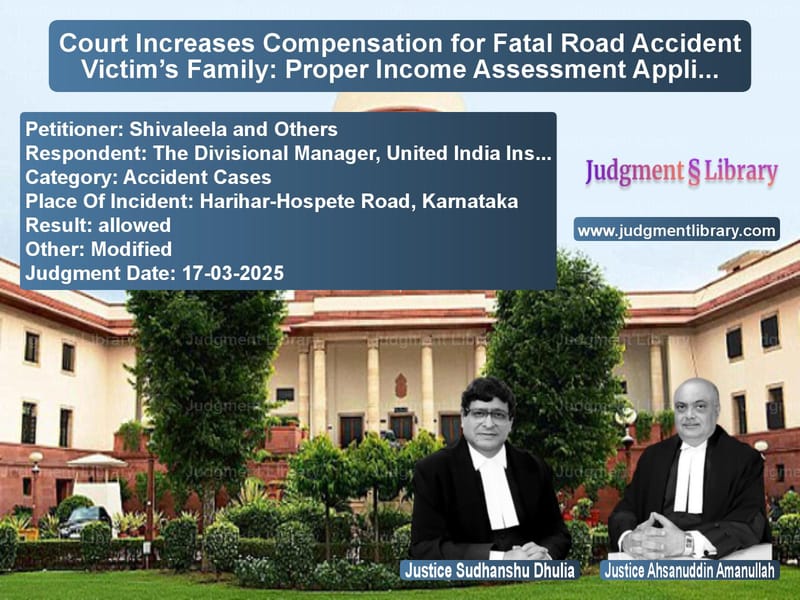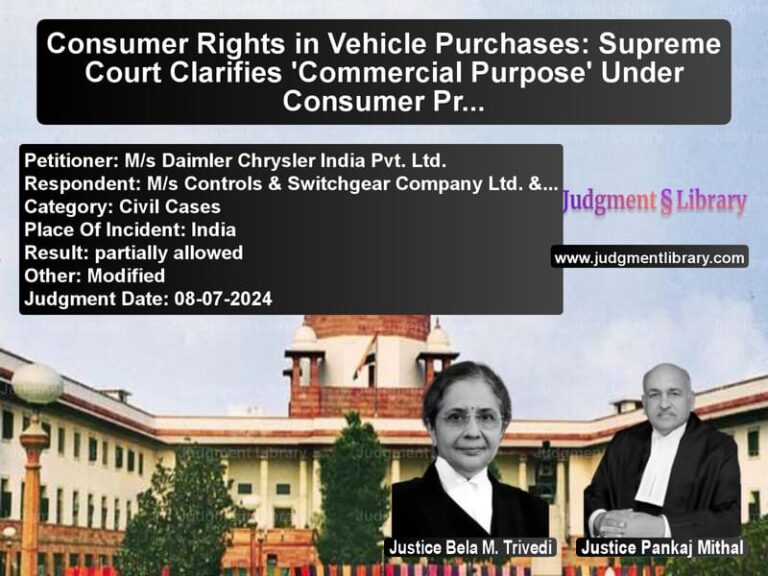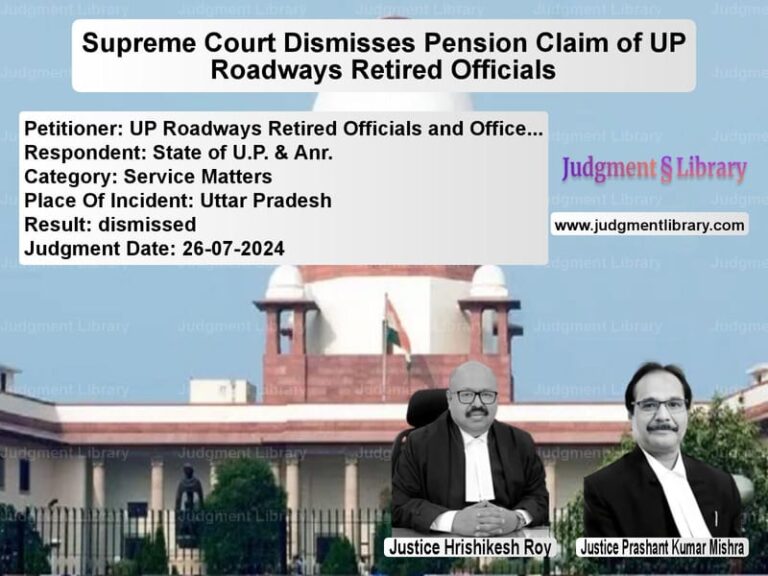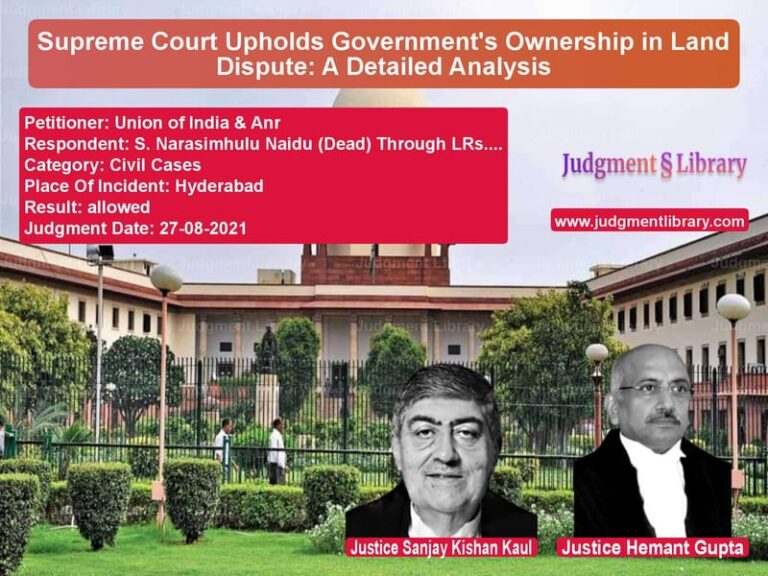Court Increases Compensation for Fatal Road Accident Victim’s Family: Proper Income Assessment Applied
In a landmark judgment, the Supreme Court of India has ruled in favor of the claimants in a fatal accident case, significantly enhancing the compensation awarded to the family of the deceased, K.H.M. Virupakshaiah. The case involved a tragic road accident where the deceased was struck by a speeding vehicle, resulting in his untimely death. The claimants, including his wife, children, and elderly father, had initially received compensation from the Motor Accident Claims Tribunal (MACT) and the Karnataka High Court, but both courts had significantly undervalued the deceased’s income, resulting in a lower compensation amount.
The Supreme Court, upon review, found that the lower courts had failed to properly assess the financial impact of the deceased’s loss on his dependents. The final judgment increased the compensation to Rs. 35,66,600, ensuring fair financial relief to the bereaved family.
Background of the Case
The accident occurred on May 5, 2012, when K.H.M. Virupakshaiah was traveling on his Bajaj motorcycle near Itagi Village on the Harihar-Hospete road. A Ford car, being driven at high speed, collided with his motorcycle, causing severe injuries that led to his death. A criminal case was subsequently registered against the driver under Sections 279, 337, 338, and later, 304-A of the Indian Penal Code (IPC).
Following the accident, the deceased’s family filed a claim before the MACT, seeking Rs. 77,15,000 in compensation, arguing that the deceased was the sole breadwinner of the family and had a substantial income from multiple sources. However, the tribunal awarded them only Rs. 25,49,000 with an interest rate of 6% per annum.
Appeal and High Court Judgment
Unhappy with the compensation amount, the claimants approached the Karnataka High Court. However, instead of increasing the compensation, the High Court reduced it further to Rs. 20,61,320, stating that the deceased’s income had been overestimated. This prompted the claimants to appeal to the Supreme Court.
Arguments Presented by the Petitioners
The claimants, represented by their legal counsel, argued that:
- The deceased was earning Rs. 40,000 per month from multiple sources, including agriculture, milk vending, and tractor rental.
- Documentary evidence, such as bank records and statements from wholesale vendors, proved his substantial income.
- The MACT and the High Court arbitrarily reduced the deceased’s monthly income to Rs. 10,000 and Rs. 8,000, respectively, without any valid justification.
The petitioners’ counsel submitted:
“The lower courts have completely disregarded the financial evidence available on record. The reduction of the deceased’s income to Rs. 8,000 is unjustified and fails to consider the true extent of his contribution to the household.”
Respondent’s Counterarguments
The insurance company, United India Insurance Co. Ltd., defended the High Court’s ruling, arguing:
- The deceased was one of multiple family members engaged in agricultural work, and the income should be divided among them.
- Rs. 8,000 per month was a reasonable and practical estimation based on the records available.
- The High Court had already considered the financial evidence and arrived at a fair conclusion.
The respondent’s counsel argued:
“The assessment of Rs. 8,000 per month as the deceased’s income is practical and well-reasoned. The claimants are exaggerating the earnings to obtain an unfairly high compensation.”
Supreme Court’s Observations and Final Ruling
The Supreme Court, consisting of Justices Sudhanshu Dhulia and Ahsanuddin Amanullah, ruled in favor of the petitioners. The bench noted that the lower courts had failed to apply the correct principles for income assessment. The Court stated:
Read also: https://judgmentlibrary.com/supreme-court-enhances-compensation-for-road-accident-victims-family/
“The MACT and the High Court have grossly undervalued the deceased’s income despite clear evidence that he was engaged in multiple professions, including farming, milk vending, and tractor rentals.”
The Court also reiterated the importance of considering future prospects when calculating compensation, referring to the precedent set in National Insurance Company Ltd. v. Pranay Sethi (2017):
“Compensation under the Motor Vehicles Act must be forward-looking. The purpose of such compensation is to provide financial security to the dependents of the deceased, ensuring that they are not left destitute due to an undervalued claim.”
Revised Compensation Breakdown
- Monthly Income: Rs. 15,000
- Future Prospects (40% Addition): Rs. 6,000
- Net Monthly Income After Deductions: Rs. 16,800
- Multiplier (16): Rs. 32,25,600
- Funeral Expenses & Loss of Estate: Rs. 33,000
- Loss of Consortium: Rs. 3,08,000
- Total Compensation: Rs. 35,66,600
Final Court Directives
The Supreme Court modified the High Court’s ruling and issued the following directives:
- The revised compensation of Rs. 35,66,600 must be paid to the claimants.
- Interest on the awarded amount must be increased to 7.5% per annum from the date of filing.
- The insurance company must comply with the order within 30 days.
With this ruling, the Supreme Court reaffirmed the importance of accurate income assessment in motor accident claims, ensuring justice for victims’ families.
Petitioner Name: Shivaleela and Others.Respondent Name: The Divisional Manager, United India Insurance Co. Ltd. & Others.Judgment By: Justice Sudhanshu Dhulia, Justice Ahsanuddin Amanullah.Place Of Incident: Harihar-Hospete Road, Karnataka.Judgment Date: 17-03-2025.
Don’t miss out on the full details! Download the complete judgment in PDF format below and gain valuable insights instantly!
Download Judgment: shivaleela-and-other-vs-the-divisional-manag-supreme-court-of-india-judgment-dated-17-03-2025.pdf
Directly Download Judgment: Directly download this Judgment
See all petitions in Road Accident Cases
See all petitions in Compensation Disputes
See all petitions in Motor Vehicle Act
See all petitions in Judgment by Sudhanshu Dhulia
See all petitions in Judgment by Ahsanuddin Amanullah
See all petitions in allowed
See all petitions in Modified
See all petitions in supreme court of India judgments March 2025
See all petitions in 2025 judgments
See all posts in Accident Cases Category
See all allowed petitions in Accident Cases Category
See all Dismissed petitions in Accident Cases Category
See all partially allowed petitions in Accident Cases Category







